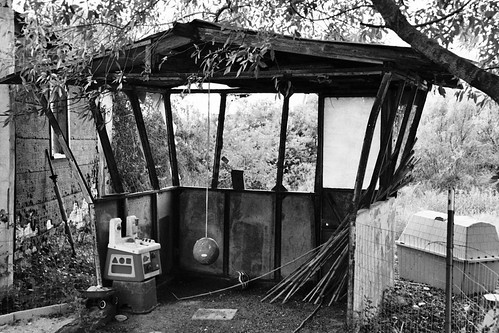
Del Rio, Dog #6
***
From the comments below:
'Anyway, I think that many people mistake or conflate the crowd mentality, the "mass" emotive response if you will, with mystical experience. In reality the experience of the true believer in the church flock is no different from that of the ideologue at the political rally. There are lots of theories that can be instructive in our piecing together of exactly how mystical experience occurs within an organized group religious context, but I think what it all comes down to is the energy of the group itself, not the WORD as I earlier defined. The energy of the group can be potent and uplifting, but it breeds dependency upon this group, its ideologies, and its rituals for the realization of this upliftment and the harnessing of that energy. Meanwhile, I can attest to having had far more fulfilling and life-affirming experiences alone and without the more fervent aspects of group ritual.
This is poorly thought out and I apologize, but it does beg the question: What then is the benefit of the group ritual and of the energy that is ganied from the group? Perhaps the group ritual has more value in the context of a more personal religious regime that fosters a relationship with the sublime independently of the group mindset - because, theoretically, in such a case the feeling of spiritual awakening would be something that has arisen organically from the individuals in the group outside of their grou ritual behavior, and has not been spread down into them during the course of a service which not only mentally but physically (see Huxley et al) makes them feel that they are tapping into something..'
***
Ya'll are jumping the gun a bit (as I wasn't going to write about the divine yet), but okay. Let me fall back on the old distinction between religious expression and/or experience and, well, God, or as you choose, the WORD, or (my preference) the ineffable--since I think most secular thought ("Huxley et al") begins somewhere with that distinction when it wants to point out that all mystical experience too much resembles other common human experiences. If there is only experience to go on, there is nothing supernatural that cannot be naturalized in exposition. That is, there is no natural reason to believe in the existence of the supernatural. So faith, I'd argue, is an act beyond evidence, beyond experience, and beyond expression. It looks beyond Nature and its order to an acknowledgment of existence, my existence, yours, all of this which is, and it strips it of its accidents and gazes towards that absence and says, despite that everything leads to nothing, I know You're there.
As K asks below, if we are to have faith at all, what are we then to do with it? "What criterion do we use to distinguish grace from madness? How do we practice genuine obedience?"
This is also the distinction (between religious expression/experience and God, or more simply, between the natural and the supernatural) I am keeping in mind as I write through these questions because I recognize I'm inclined to make the dangerous leap towards a dialectical argument or towards a defense of subjective relativism while I attempt to describe how my experiences have shaped my understanding of the divine. As I've heard said, superstition is the other guy's religion, so while I don't disagree with your pointing out pitfalls of the madness of crowds, and while I've targeted some pitfalls of my own, I'm holding in reserve a decision to believe, with Kierkegaard, that faith requires an "infinite resignation" and an "infinite movement," neither of which I am capable on my own.
To my mind, most of the rest, the "in which" of expression and experience--in the garden, in silent meditation, in the ritual crowd, in speech acts, in personal feeling, in the monastery chapel (which is always open)--resides within the sensible, aesthetic, finite world where those of us who would seek viable paths towards the incomprehensible infinity of the divine are challenged to remain confronted by what divine absence means: God is not in the flowers; the flowers are in God. The former ("God is in the flowers") is not entirely wrong, but it quickly leads to a distortion, a communion with things mistaken for God. The latter, however, is impossible to grasp. It is full of hope.
***